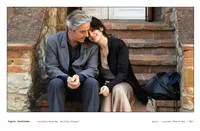Review: Certified Copy
Written by

Reviewed By Simon Zhou
Certified Copy
dir. Abbas Kiarostami
Reviewed By Simon Zhou
Certified Copy
dir. Abbas Kiarostami
ACTING IS EXTRAORDINARLY DIFFICULT. In order to act well, one must truly feel the emotions a character is feeling; create a set of imaginary circumstances and convince oneself in their reality; ignore the presence of the audience or the camera crew with their buzzard of lights or coughing, who do not exist in that imaginary reality; and by the simple act of faith, be moved by those imagined circumstances.
I mention this in relation to Abbas Kiarostami’s Certified Copy for two reasons. The first is that lead actress, Juliette Binoche, does the remarkable thing of making the aforementioned seem incredibly easy. The second is because the questions one might ask around the process of acting are the same questions at the centre of this film. When an actor truly connects with her role, when she feels and thinks and acts precisely as the circumstances demand – why do we say that this is not real? Or, to put it another way, what is the difference – just in that single moment – between this, and ‘reality’? If a man behaves like one in love, believes in the reasons for behaving like a man in love, feels the feelings of a man in love – is he not in love?
Certified Copy follows a middle-aged writer, James (William Shimell) who is in Tuscany promoting a book that questions the objective value of an original work of art over a copy of that original. His argument is based on the idea that authenticity is a false criteria, and that the true criteria is simply the subjective experience of the viewer with the work of art – in which case, there is no differentiation between an original, or a copy. Whilst promoting his book, he meets a French woman who owns an antique art gallery (Juliette Binoche), and sparked by a fortuitous misunderstanding in a small cafe, they proceed to enact the very relationship James argues in his book, by pretending to be a couple that has been married for fifteen years. In doing so, they each explore the funny but true clichés about marriage, the different things a man and a woman wants from a relationship, imagined histories that stem from their personal realities, the dynamics of desire, and finally, the desire for permanence. They become a ‘copy’ of a real relationship, a real marriage, and in doing so, are forced to confront the unavoidably real – if only they, and we, could work out what it was.
Kiarostami is exploring a familiar concern of his in the separation, and dissolution, of the line between imagined and real experience, reality and representation. Just as he takes his audience into the mise-en-scene (the physical space of the scene), placing us literally in the point of view of the audience to a lecture that takes place in the film, he spits us back out with a self-awareness that breaks the illusion of the fourth-wall, with Binoche looking directly at the camera, and then waving (she is revealed to be waving to a couple outside a window). Sweetly and deeply romantic - there is a playfulness to the film’s conceit, a warmth to the self-aware role-play between the two main characters. It results in moments of pure comedy that will have you nodding in recognition of the universal plights and misunderstandings between men and women, lovers and couples. But as with all his films, underneath the whimsy is a deeply philosophical discourse, conversant with ideas of power, hegemony, nihilism, and death. I was reminded of Shakespeare’s A Midsummer Night’s Dream in its mischievous, but sincere examination of the integrity, or authenticity, of the edifice that we as a society have built around the condition of love. As the film spirals towards its simple conclusion, the artefacts of artifice (or is that authenticity?) unravel, revealing (or is that concealing?) a poignant and affecting rumination on the lie of love – as well as its truth.
Certified Copy is Kiarostami’s first film shot outside of his native Iran, and is a precious example of a film that truly makes you think, and truly makes you feel. It’s ending – abrupt, confounding, and perfect, completely articulates its theme of the indistinction, and confusion, between the real and the imagined. Indeed, what exactly is real, and how do we define it? It is a question that cuts to the nature of our existence. As I was leaving the cinema, I heard an old lady, who obviously had not liked the film, remark that she wished she’d just stayed home and watched television. Just as it is a recurring accusation in the film that it is the habit of women – methinks the lady doth protest too much. Perhaps she was looking for an opiate, and was not prepared for a revelation.